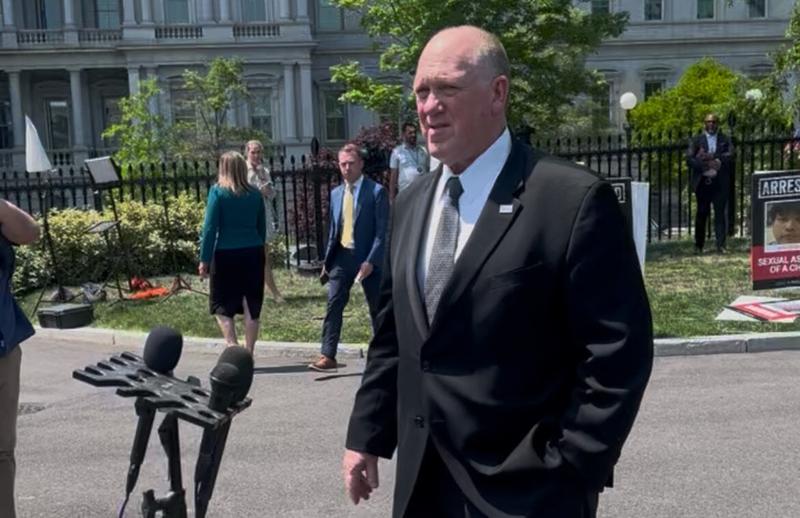The Texas legislature on Saturday advanced a bill that authorizes limited support for Trump administration border security enforcement.
After SB 8, filed by state Sen. Charles Schwertner, R-Georgetown, passed the Senate, a substitute bill passed the House filed by Rep. David Spiller, R-Jacksboro, which the Senate rejected. A conference committee released a revised bill on Saturday.
It only applies to “certain sheriffs” that operate jails or enter into contracts with vendors that operate jails, according to the bill language. It doesn’t apply to state agencies or police departments. It doesn’t respond to a Trump administration request for all law enforcement officials in all counties nationwide to participate in a federal immigration program referred to as 287(g). Named after a section of the 1996 Immigration and Nationality Act, it authorizes U.S. Immigration and Customs Enforcement to delegate to state and local law enforcement officers specified immigration functions under ICE supervision.
Under the Biden administration, former Homeland Security Secretary Alejandro Mayorkas limited 287(g) participation to a jail model, which the Texas bill follows.
The Trump administration expanded 287(g) to three models, a Jail Enforcement Model (JEM), Task Force Model (TFM) and Warrant Service Officer (WSO) model, The Center Square reported. Additional models may be rolled out in the future. ICE provides free training, saying it “bears the cost of 287(g) training for law enforcement agencies.”
As of May 29, law enforcement agencies in 40 states were participating in 287(g), with the greatest number of agreements signed in Florida, The Center Square reported.
Florida agencies are participating in all three models, including Florida’s 67 sheriff’s offices; roughly 90 police departments; multiple university police departments, including boards of trustees; county commissioners; airport police; multiple departments of corrections, among others. No other state has the level of participation that Florida does.
By comparison, 64 Texas sheriffs have signed at least one 287(g) agreement with ICE, as well as the Nixon Police Department, Texas National Guard and Texas Office of Attorney General. Applications are pending from four additional sheriffs, as of May 29 data.
Current sheriff participation represents roughly 27% of Texas’ 254 counties. The majority are counties with small populations with limited funds. Notably absent are the Texas Department of Public Safety, Texas Department of Criminal Justice, and other state agencies. By contrast, Democratic-led Arizona Department of Corrections and Massachusetts Department of Corrections are participating in the JEM.
Just because President Donald Trump has largely shut down illegal border crossings doesn’t mean law enforcement efforts are finished, ICE says. State and local law enforcement have “four years to eliminate cartel activities in our communities,” Goliad Sheriff Roy Boyd, who leads an Operation Lone Star Task Force in multiple counties, told The Center Square.
“The reason we need everybody to participate in 287(g) is pretty simple. The people that are in this country illegally are beholden to the cartels and their contractors. The only way to get rid of the cartel presence in the United States is to apprehend illegal aliens in our counties and state,” he said. “As long as those people are here, the cartels have the logistical means they need to conduct their business, whether that is their slave trade, moving drugs, moving money, stealing oil in the Permian Basin.”
Cartel operatives also adapting and changing their methods, he and others in the OLS Task Force told The Center Square. “The reason we formed the task force was to deny the cartels the ability to operate freely within the jurisdictions of task force members,” he said. Their efforts have so far proved successful, with cartel operatives going around task force counties to avoid being apprehended, The Center Square first reported.
In nearby Lavaca County, where the previous sheriff wouldn’t participate in task force operations, drug trafficking went unchecked until a new sheriff was elected and is now participating in the task force, The Center Square exclusively reported.
Law enforcement at the state and local levels need to prepare for the future expecting a Biden administration 2.0 to reverse Trump administration policies, task force members say.
Now that Trump’s in office, “We need to keep the momentum going,” founding task force member Brooks County Sheriff Benny Martinez told The Center Square. “Trump’s term is only four years, 48 months and it’s gone. We need to think ahead for the next term already. We’ve got to do it now because [border security] has to be sustained. We just can’t give that up.”
“When President Trump is out of office, if the next administration does not take the same strong stance against the cartels, the cartels will be right back up at full production across the United States, bringing their product over. This is our opportunity to defund the cartels’ operations in our counties and state, and eventually nationwide,” Boyd said.
The current bill “is a continuation of the Mayorkas model,” task force members said, excluding the field enforcement component. Without field enforcement, the Trump administration won’t have the support it needs, they argue.
Without weighing in on the specifics of the bill, Trump border czar Tom Homan advocates for a whole of government approach targeting criminal illegal foreign nationals.
“Law enforcement at the local, state and federal levels should all work together seamlessly to protect our communities from illegal alien public safety threats. It’s plain common sense,” he told The Center Square.






